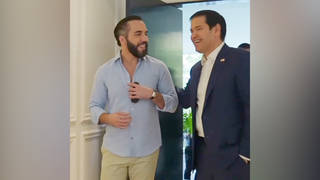
Related
Topics
Guests
- Spc. Victor AgostoUS Army specialist who refused to deploy to Afghanistan. He will be court-martialed today and faces jail time.
US Army Specialist Victor Agosto faces up to one month in jail for refusing to deploy to Afghanistan. After returning from thirteen months in Iraq, Agosto became a victim of the stop-loss program that has extended the tours of more than 140,000 troops beyond their contracts since 9/11. Just hours before his court-martial, Agosto speaks out from his military base at Fort Hood, Texas. [includes rush transcript]
Transcript
AMY GOODMAN: We turn now to the growing movement of GI resisters in this country. A US Army specialist who refused to deploy to Afghanistan faces a court-martial today and up to a month in jail. Twenty-four-year-old Specialist Victor Agosto from Miami spent thirteen months in Iraq with the 57th Battalion. When he returned to the Fort Hood military base in Killeen, Texas last November, he thought his contract with the Army would end this summer. But Agosto became a victim of the stop-loss program that has extended the tours of more than 140,000 troops beyond their contracts since 9/11. After nearly four years with the Army, Agosto was told he would be deployed to Afghanistan.
When he returned to base, Agosto had become a member of Iraq Veterans Against the War and decided not to go to Afghanistan. He went public with his decision, saying, quote, “There is no way I will deploy to Afghanistan. The occupation is immoral and unjust. It does not make the American people any safer. It has the opposite effect,” he said.
Well, Victor Agosto will be court-martialed in just over an hour from the time of this broadcast. He joins us now by telephone from Fort Hood, Texas.
Welcome to Democracy Now!, Victor Agosto. Tell us where you are and why you have made this decision not to go to Afghanistan, after having served for more than a year in Iraq.
SPC. VICTOR AGOSTO: Well, right now I’m on Fort Hood. And I decided that I just — I couldn’t, in good conscience, deploy to Afghanistan. I don’t believe that we’re actually there to fight terror or that terror can even be fought on the battlefield. And then that’s basically — that’s basically it. I just — I don’t — I just can’t do it.
AMY GOODMAN: How did you come to this decision?
SPC. VICTOR AGOSTO: When I was in Iraq, I had done some reading. I thought about why I was actually there, why were we involved in these wars. And I read Noam Chomsky’s Hegemony or Survival, and it was from there that I realized that the concept that I had that we were there to help the people of Iraq, that America had some sort of moral superiority, was completely shattered from what I read there.
AMY GOODMAN: Are you applying for conscientious objector status?
SPC. VICTOR AGOSTO: No, I decided against that, because as far as the Army is concerned, a conscientious objector is someone who is opposed to all wars, and that’s not me. I believe that sometimes war is necessary in cases of legitimate self-defense and legitimate resistance.
AMY GOODMAN: You just feel Afghanistan is wrong.
SPC. VICTOR AGOSTO: Yes, I don’t feel that we’re making the world any safer by doing that. We’re just killing people and spreading suffering with no real justification.
AMY GOODMAN: Now, explain. You were supposed to — your tour of duty should have ended, or your service in the military, when?
SPC. VICTOR AGOSTO: Yesterday, actually.
AMY GOODMAN: Yesterday.
SPC. VICTOR AGOSTO: Yes.
AMY GOODMAN: So why are you being sent back, or why are they trying to?
SPC. VICTOR AGOSTO: Why — I suppose they just need more people, so they stop-lossed me.
AMY GOODMAN: “Stop-loss” means they can just call you back, even though your term is supposed to end.
SPC. VICTOR AGOSTO: Yes. They can retain me past my original enlistment in order to deploy again.
AMY GOODMAN: Our next guest, Camilo Mejia, is the first GI who served in Iraq to have publicly resisted the war, and he was imprisoned for refusing to go back. We’re going to speak with him in a minute. He went underground. You’ve chosen, Victor Agosto, not to go underground, but actually to remain at Fort Hood. Why is that?
SPC. VICTOR AGOSTO: As I struggled with my decision, I learned of the effect of the GI resistance movement during the Vietnam War. And I thought that if I were to go AWOL, my commanders could tell other soldiers that — you know, that I left because I was scared, that, you know, I had other reasons, whereas if — whereas by staying on base, I can set an example for other soldiers to see that, you know, that I think this war is wrong, and I’m just not going to do it and that, you know, I think they should do the same.
AMY GOODMAN: What is the response of others on Fort Hood, as you’ve become this public symbol of GI resistance?
SPC. VICTOR AGOSTO: Well, they’ve generally been positive or neutral. I’ve had fellow soldiers come and want to shake my hand or flash me a peace sign or something like that. Some people have expressed their disapproval, but usually they’ll say something — they’ll start out by saying how much they respect me, but they disagree with what I’m doing. But I don’t really encounter a lot of — I don’t really encounter any bitterness towards my decision.
AMY GOODMAN: Victor Agosto, can you talk about your time in Iraq? Where were you stationed? What did you do there?
SPC. VICTOR AGOSTO: I was stationed at Forward Operating Base Q-West, and basically I worked at what’s called a technical control facility, where I configured computers, routers, switches, servers. But I never — I was never in combat. I never felt any danger. I never felt the need to fire my weapon. And that’s it.
AMY GOODMAN: What are you feeling right now? In just about an hour’s time, how exactly does the process happen?
SPC. VICTOR AGOSTO: I’ll be tried and — you know, be tried and likely convicted of refusing the order of a noncommissioned officer to SRP, which is a process that every soldier has to go through before they deploy. And then they’ll immediately take me to Bell County Detention Center, where I’ll probably serve thirty days.
AMY GOODMAN: Did it surprise you that President Obama has escalated the war in Afghanistan?
SPC. VICTOR AGOSTO: No. No, it doesn’t, because he said he would do so during his campaign. Part of why I’m doing what I’m doing is because I don’t believe that any politician can end this war. I think that it has to be ended at the grassroots level. Soldiers, by refusing to fight, can bring about the end of the war.
AMY GOODMAN: What message do you have for other GIs, for other people in the military?
SPC. VICTOR AGOSTO: I would say that you would never — you’ll never regret following your conscience and that adherence to an oath is not a valid excuse for betraying your conscience.
AMY GOODMAN: US Army Specialist Victor Agosto, served a thirteen-month deployment in Iraq, is now refusing to go to Afghanistan. He is expected to be court-martialed in the next hour. And we will continue to follow his case, as we turn now to — best of luck to you, Victor Agosto.
SPC. VICTOR AGOSTO: Thank you, Amy.












Media Options